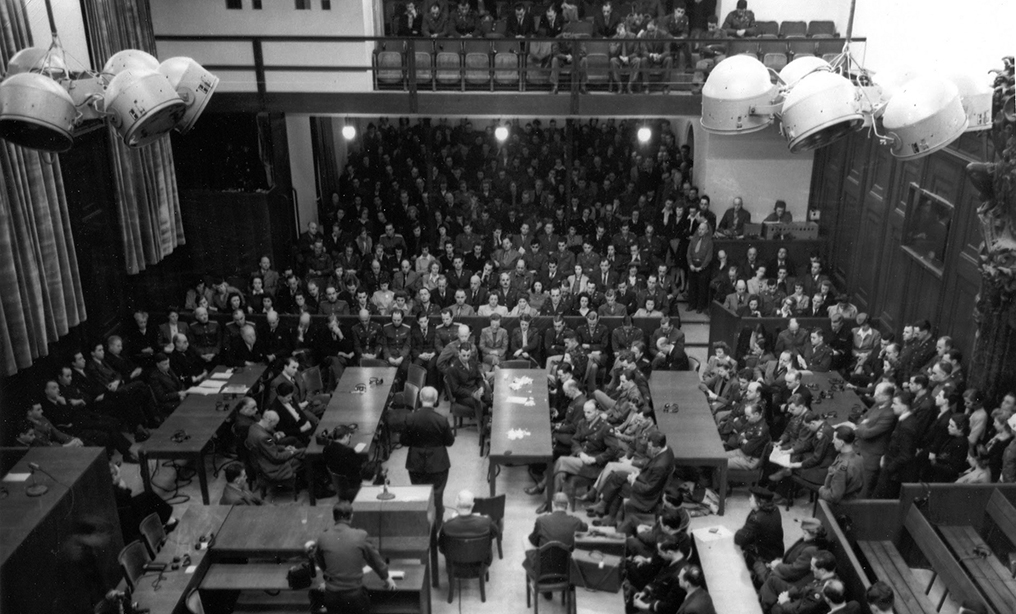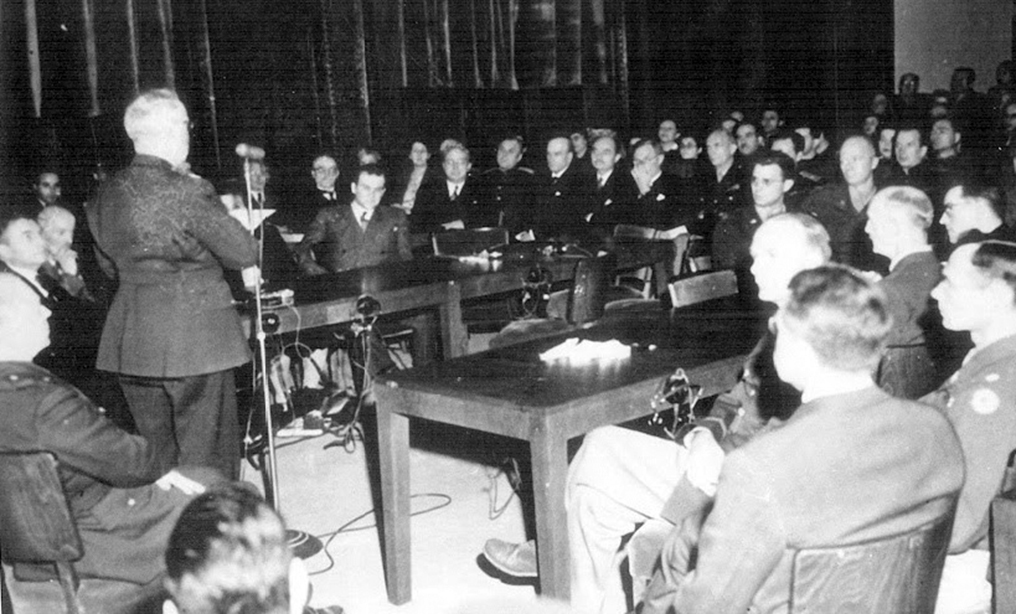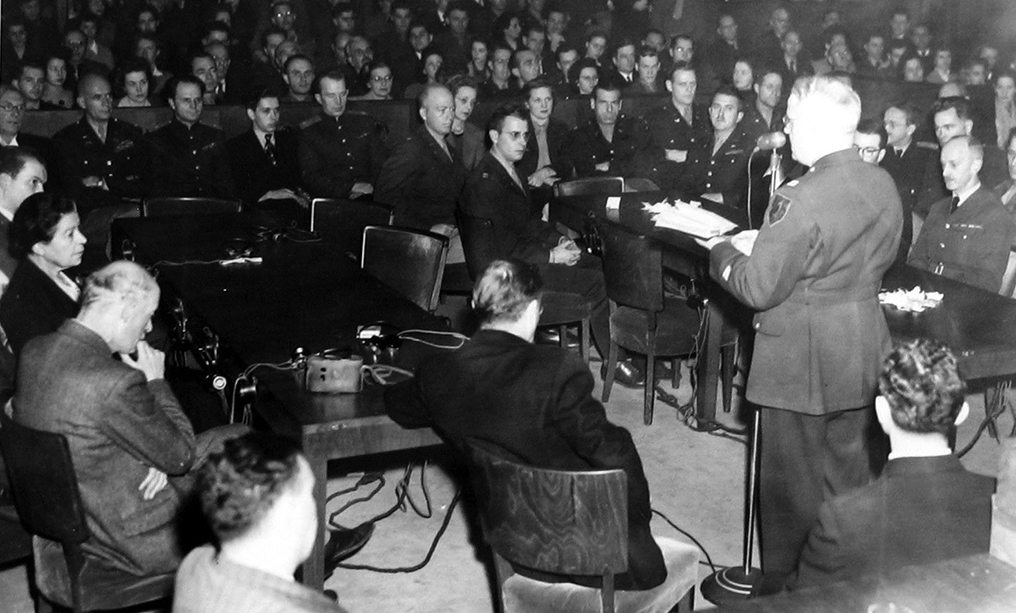Jackson List: Father Walsh on Nuremberg Thanksgiving, 1945
At Nuremberg, the second trial day had been simply that, a Thursday, November 22, 1945. But in the U.S., that was Thanksgiving Day.
November 27, 2019 at 03:34 PM
6 minute read
 An aerial shot of the courtroom showing Pastor Gerecke speaking at the Thanksgiving Day service in Nuremberg in 1945. Justice Jackson's head is bowed respectfully—perhaps in keeping with his assignment from President Truman and U.S. representational role, his general irreligiousity notwithstanding. And throughout the courtroom, many other heads are bowed too. Courtesy photo
An aerial shot of the courtroom showing Pastor Gerecke speaking at the Thanksgiving Day service in Nuremberg in 1945. Justice Jackson's head is bowed respectfully—perhaps in keeping with his assignment from President Truman and U.S. representational role, his general irreligiousity notwithstanding. And throughout the courtroom, many other heads are bowed too. Courtesy photo
In summer 1953, Justice Robert H. Jackson wrote to an old friend, Father Edmund A. Walsh, S.J. He was a Catholic priest, the Vice-President of Georgetown University, and the Regent of its School of Foreign Service. Father Walsh then had been hospitalized for many months, and Justice Jackson was writing, actually while on vacation in California, to inquire about Walsh's health and to wish him well.
Justice Jackson and Father Walsh had been friends for many years. They became acquainted in Washington, D.C., in the 1930s.
In 1945, they formed a close bond when Walsh, then a United States Army Captain, served on U.S. Chief of Counsel Jackson's staff prosecuting the principal Nazi war criminals before the International Military Tribunal at Nuremberg. Walsh performed a number of significant tasks before and during the trial, including supervising the gathering of evidence on Nazi religious persecution.
At Nuremberg, the second trial day had been simply that, a Thursday, November 22, 1945. But in the U.S., that was Thanksgiving Day.
And around the world, that November was the first November of peace following years of world war.
So in Nuremberg that afternoon, after the trial day had concluded, hundreds of military and civilian Allied personnel—from France, the U.K., the U.S., and the U.S.S.R.—remained in Courtroom 600 to observe the American holiday.
Eight years later, this occasion was vivid in Father Walsh's mind. He wrote to Justice Jackson that:
[a]mong other things preserved in my memory one will always stand out very prominently, the day you said to me: "Father Walsh, this is Thanksgiving Day and I intend to convene all the personnel of the American Delegation in the courtroom for an appropriate ceremony. The ceremony will include the reading of the President's proclamation after which you will please give an interpretation of the document, after which the Protestant chaplain will do the same to be followed by a spokesman of the Jewish faith." I have a picture of that occasion and I often look at it to study the look of puzzlement on the faces of the Russian Delegation. They would probably understand that the name of God would be mentioned in church, but that the legal fraternity, headed by your distinguished self, should openly thank God for the graces and benefits of the past year was something outside the tenets of the Communist Manifesto and surely alien to any protocol contrived by the Kremlin.
Father Walsh was, in 1953, remembering the ceremony quite accurately. Justice Jackson had, opening it—as his trial opening statement the previous day had begun the prosecution cases—explained briefly the U.S. history and tradition of Thanksgiving.
Jackson had then called on Captain/Father Walsh, who offered an opening prayer. Lieutenant Commander Harold Leventhal (U.S. Coast Guard Reserve), a prosecutor on Jackson's staff and a Jew, then read from the Psalms.
Lieutenant Henry F. Gerecke (U.S. Army Chaplain Corps), newly appointed as chief Protestant chaplain at the Nuremberg prison to minister to defendants and other prisoners there, gave the closing benediction.
On this coming Thursday, whether or not you are in the U.S., I hope that you will gather with others, have things to be thankful for, and do that in the way that is meaningful to you.
These photographs below capture the Thanksgiving 1945 observance in Nuremberg's Courtroom 600.
John Q. Barrett is a Professor of Law at St. John's University and Robert H. Jackson Center board member and Elizabeth S. Lenna Fellow.
 Pictured above is Pastor Gerecke speaking during Thanksgiving 1945 observance in Nuremberg's Courtroom 600. Justice Jackson (in dark suit) and Father Walsh (in military uniform), both at far left, watch and listen to him. Courtesy photo.
Pictured above is Pastor Gerecke speaking during Thanksgiving 1945 observance in Nuremberg's Courtroom 600. Justice Jackson (in dark suit) and Father Walsh (in military uniform), both at far left, watch and listen to him. Courtesy photo. This photograph, taken from the other side, again shows Pastor Gerecke delivering closing prayer. Leventhal is seated behind him. Jackson, center, is leaning on the edge of a table. At its far end, seated along the bench inside the courtroom's well, are, left to right, Judge Norman Birkett (U.K.), Colonel Robert J. Gill (U.S. Army, Corps of Military Police and Jackson's Executive Officer, in uniform); General Iona T. Nikitchenko (U.S.S.R. judge, in uniform), interpreter Oleg Troyanovsky (U.S.S.R.), and Lt. Col. Alexander F. Volchkov (U.S.S.R. judge, in uniform). This photograph is what Father Walsh had in his possession and described in his 1953 letter to Justice Jackson. Courtesy photo
This photograph, taken from the other side, again shows Pastor Gerecke delivering closing prayer. Leventhal is seated behind him. Jackson, center, is leaning on the edge of a table. At its far end, seated along the bench inside the courtroom's well, are, left to right, Judge Norman Birkett (U.K.), Colonel Robert J. Gill (U.S. Army, Corps of Military Police and Jackson's Executive Officer, in uniform); General Iona T. Nikitchenko (U.S.S.R. judge, in uniform), interpreter Oleg Troyanovsky (U.S.S.R.), and Lt. Col. Alexander F. Volchkov (U.S.S.R. judge, in uniform). This photograph is what Father Walsh had in his possession and described in his 1953 letter to Justice Jackson. Courtesy photoThis content has been archived. It is available through our partners, LexisNexis® and Bloomberg Law.
To view this content, please continue to their sites.
Not a Lexis Subscriber?
Subscribe Now
Not a Bloomberg Law Subscriber?
Subscribe Now
NOT FOR REPRINT
© 2025 ALM Global, LLC, All Rights Reserved. Request academic re-use from www.copyright.com. All other uses, submit a request to [email protected]. For more information visit Asset & Logo Licensing.
You Might Like
View All
Law Journal Column on Marital Residence Sales in Pending Divorces Puts 'Misplaced' Reliance on Two Cases
8 minute read

A Time for Action: Attorneys Must Answer MLK's Call to Defend Bar Associations and Stand for DEI Initiatives in 2025
5 minute readTrending Stories
- 1Thursday Newspaper
- 2Public Notices/Calendars
- 3Judicial Ethics Opinion 24-117
- 4Rejuvenation of a Sharp Employer Non-Compete Tool: Delaware Supreme Court Reinvigorates the Employee Choice Doctrine
- 5Mastering Litigation in New York’s Commercial Division Part V, Leave It to the Experts: Expert Discovery in the New York Commercial Division
Who Got The Work
J. Brugh Lower of Gibbons has entered an appearance for industrial equipment supplier Devco Corporation in a pending trademark infringement lawsuit. The suit, accusing the defendant of selling knock-off Graco products, was filed Dec. 18 in New Jersey District Court by Rivkin Radler on behalf of Graco Inc. and Graco Minnesota. The case, assigned to U.S. District Judge Zahid N. Quraishi, is 3:24-cv-11294, Graco Inc. et al v. Devco Corporation.
Who Got The Work
Rebecca Maller-Stein and Kent A. Yalowitz of Arnold & Porter Kaye Scholer have entered their appearances for Hanaco Venture Capital and its executives, Lior Prosor and David Frankel, in a pending securities lawsuit. The action, filed on Dec. 24 in New York Southern District Court by Zell, Aron & Co. on behalf of Goldeneye Advisors, accuses the defendants of negligently and fraudulently managing the plaintiff's $1 million investment. The case, assigned to U.S. District Judge Vernon S. Broderick, is 1:24-cv-09918, Goldeneye Advisors, LLC v. Hanaco Venture Capital, Ltd. et al.
Who Got The Work
Attorneys from A&O Shearman has stepped in as defense counsel for Toronto-Dominion Bank and other defendants in a pending securities class action. The suit, filed Dec. 11 in New York Southern District Court by Bleichmar Fonti & Auld, accuses the defendants of concealing the bank's 'pervasive' deficiencies in regards to its compliance with the Bank Secrecy Act and the quality of its anti-money laundering controls. The case, assigned to U.S. District Judge Arun Subramanian, is 1:24-cv-09445, Gonzalez v. The Toronto-Dominion Bank et al.
Who Got The Work
Crown Castle International, a Pennsylvania company providing shared communications infrastructure, has turned to Luke D. Wolf of Gordon Rees Scully Mansukhani to fend off a pending breach-of-contract lawsuit. The court action, filed Nov. 25 in Michigan Eastern District Court by Hooper Hathaway PC on behalf of The Town Residences LLC, accuses Crown Castle of failing to transfer approximately $30,000 in utility payments from T-Mobile in breach of a roof-top lease and assignment agreement. The case, assigned to U.S. District Judge Susan K. Declercq, is 2:24-cv-13131, The Town Residences LLC v. T-Mobile US, Inc. et al.
Who Got The Work
Wilfred P. Coronato and Daniel M. Schwartz of McCarter & English have stepped in as defense counsel to Electrolux Home Products Inc. in a pending product liability lawsuit. The court action, filed Nov. 26 in New York Eastern District Court by Poulos Lopiccolo PC and Nagel Rice LLP on behalf of David Stern, alleges that the defendant's refrigerators’ drawers and shelving repeatedly break and fall apart within months after purchase. The case, assigned to U.S. District Judge Joan M. Azrack, is 2:24-cv-08204, Stern v. Electrolux Home Products, Inc.
Featured Firms
Law Offices of Gary Martin Hays & Associates, P.C.
(470) 294-1674
Law Offices of Mark E. Salomone
(857) 444-6468
Smith & Hassler
(713) 739-1250







